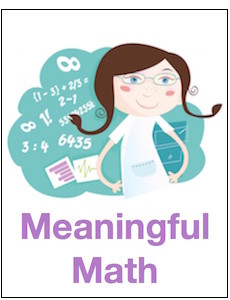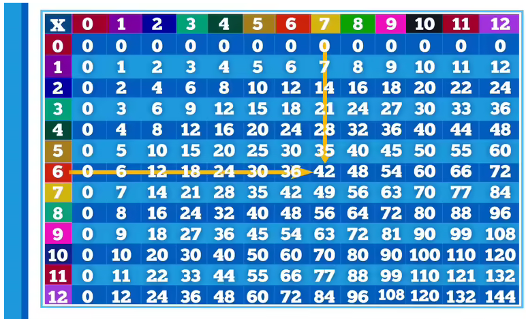What Do We Do About Kids Behind in Math?
A MiddleWeb Blog
 I teach Algebra I to 10th graders. This happened recently.
I teach Algebra I to 10th graders. This happened recently.
I put this problem on the board to illustrate the concept of distribution:
3(x + 1/4) (distribute the 3)
I then wrote the following:
3x + 3/4
I immediately heard a chorus of “Where did the 3/4 come from?” So off to the side I showed them that 3 multiplied by 1/4 is 3/4. They were satisfied on that count, but now distributing had been forgotten.
This exact scenario happens in every lesson, every day. (In the example above the issue was not knowing how to multiply three by a fraction, but even if it had been three multiplied by six, at least a few students still would have been confused).
It’s not that I mind explaining, I don’t. But they are having a hard time learning new material because they haven’t mastered old concepts. Students understand higher levels of math much better when they can build on the concepts they have already mastered.
These unmastered foundational skills keep students stuck in no man’s land; they don’t understand past concepts and they are not learning new ones either.
Obviously, this is having an impact on their learning, but there is also an emotional toll. I see how dejected they are when they don’t know how to start a problem or can’t follow along with what’s happening. It’s easy to see why they become disengaged. I understand why some students feel the need to resort to Googling the answer or use Photomath; they don’t feel like they have any other options.
Why so many unmastered concepts?
First of all, this should never become a blame game. I know these students have been taught these concepts; I know their previous teachers and they did the right things. So why haven’t the students mastered the concepts?
Well, some students moved from one school to another; some students were very sick for periods of time; other students were dealing with family issues. Obviously Covid-19 has had an impact, but if I am being honest, this is not a new problem.
Sometimes confidence can be the problem. I’ve had personal experience with this. In 6th grade, almost overnight, I couldn’t see the board. I was in advanced math class and on the math team. In the time it took me to get glasses I was a whole unit behind. I should have told the teacher I couldn’t see the board, but I was too shy to do that. It wrecked my confidence and left me with a lot of gaps.
Sometimes it’s just a matter of individual differences. It’s a fact that some students take longer to master concepts. There is nothing wrong with that. Once they “get it” they can be as proficient as any other student. But it does require us to individualize our teaching to take these differences into account.
Whatever the cause, what do we do?
Whatever the source of the problem, I’m still left with the need to help students master unlearned concepts while simultaneously teaching them new and more advanced concepts. In short, I need a systematic, effective way to teach all the Algebra I standards and help students with those concepts and skills they didn’t master the first time, addressing the gaps that are hindering their mastery of current standards.
I will be honest. I haven’t found the magic formula yet. In fact, I was becoming a little discouraged – until I read Sean Cavanagh’s article, Low Performers Found Unready to Take Algebra, which said you can’t expect to make up several years of math in a year or two.
As state and school leaders across the country push to have more students take algebra in 8th grade, a new study argues that middle schoolers struggling the most in math are being enrolled in that course despite being woefully unprepared.” – Education Week (September 2008)
The same article (written in 2008) said that some students who were taking Algebra I had the math skill levels of 2nd or 3rd graders. How that compares to 2021, I’m not sure, but other reading and my own experience suggest this problem of students falling further and further behind still persist.
Just realizing it’s not all my fault helped immensely, and it also let me shift gears and think logically about what I could do. Over the course of several weeks, I came up with the following goals.
My Goals:
✻ Teach current standards so that students don’t get further behind.
✻ Ensure that students have the math automaticity they need to be successful. (For example: know multiplication tables to 12, add/subtract and multiply/divide fractions, combine like terms, do one step equations, combine positive and negative numbers, understand distribution and how to do it.)
✻ Give attention and thought to students who aren’t struggling and strive to help them advance.
✻ Support all my students and help them enjoy math wherever they are on the learning spectrum.
So those are the goals. The challenge is implementing them in a 55-minute class period that feels like 45 minutes.
Plan to Accomplish My Goals:
This is my plan for the 2nd semester to help me achieve the goals above.
1.) Multiplication matrix (keep it posted at all times and make a laminated copy for students). Students need to know their multiplication facts.

3.) Purposefully embed concepts where I can tie in current standards (for example, when we study systems of equations, I can review graphing lines, combining like terms, etc.).
4.) When we have a few minutes in class, give students yellow paper (I’m going to use yellow because that’s what I have the most of) with problems that help them practice basic math skills. Yellow paper will signal NO CALCULATOR allowed.
Final Thoughts
I am going to have to remind myself to be realistic about what can be accomplished in one period: if we spend too much time on past concepts, I won’t have the time I need to spend on current standards.We’ll have to be satisfied with slow, incremental growth; I have no choice but to work with the time I have.
When students are working below grade level, nothing is easy for them and they need to be allowed to celebrate their victories. Just because they are behind right now doesn’t mean they can’t get caught up or make progress.
Above all, I want students to find something in math that they are good at and can enjoy! I will make that a priority every day.
If you have any suggestions about how to help students who are struggling with foundational concepts while taking Algebra I or II, please share them with me!
ALSO SEE THESE ARTICLES BY MICHELLE:
My Students Struggle to Solve Basic Equations (02/2024)
Refreshing Students’ Equation Solving Skills (10/2021)






























This article was very helpful! my daughter is in 8th grade in alegbra but needs to go back a couple of years to get her foundation more strong. How do you suggest going back in time to see where she is and how she needs to practice past math?
Thank you for your comment! I think a good place to start would be to talk with her teacher and get input. The teacher often knows where the gaps are. Also, as you work with her on her current problems notice where she is struggling. For example, does she need a calculator for solving equations because she has trouble mulitplying or dividing? Are fractions causing her to miss problems? You don’t have to spend hours every night either, I think shorter more frequent study sessions are more beneficial. I hope this helps! Good Luck!
Hi Michelle — I am a middle school parent who recently started volunteering at my son’s school as a math tutor. The kids I’m working with lack those automatic skills you mention, so I’ve been looking for ways to support them. If you have any materials you recommend (worksheets? apps? what do you use?) let me know. Thanks!
Hi Michelle,
Thanks so much for these thoughts! I work with students who dropped out during the pandemic and they have forgotten so many things and miss so many things in math.
You wrote that one of your goals would be: “Ensure that students have the math automaticity they need to be successful. (For example: know multiplication tables to 12, add/subtract and multiply/divide fractions, combine like terms, do one step equations, combine positive and negative numbers, understand distribution and how to do it.)”
I think that is the best help you can be to a student trying to complete a required algebra 1 course. Any chance you ever put together a program or a complete quideline of those “greatest hits” for success in algebra?
Thanks so much for your time!
Becky
Dear Becky – We wanted to call your attention to Michelle’s recent article (February 2024) – My Students Struggle to Solve Basic Math Problems. To learn why her 11th graders have so much trouble with simple equations, Michelle sat with each one as they attempted to solve two middle school-level problems. Read about the insights she gained and the strategies she’s considering to help them master the basics.
– MiddleWeb editors
I don’t have anything like that-I wish I did! I usually end up trying stop gap measures. I do remember one year when I taught a whole class just for remediating math I used Khan academy a lot. I know people have different opinions about it, but I found it helpful and it’s free. They have a set of activities called Getting Ready for Algebra I. I’ll put the link below. Thanks for your comment!
https://www.khanacademy.org/math/get-ready-for-algebra-i